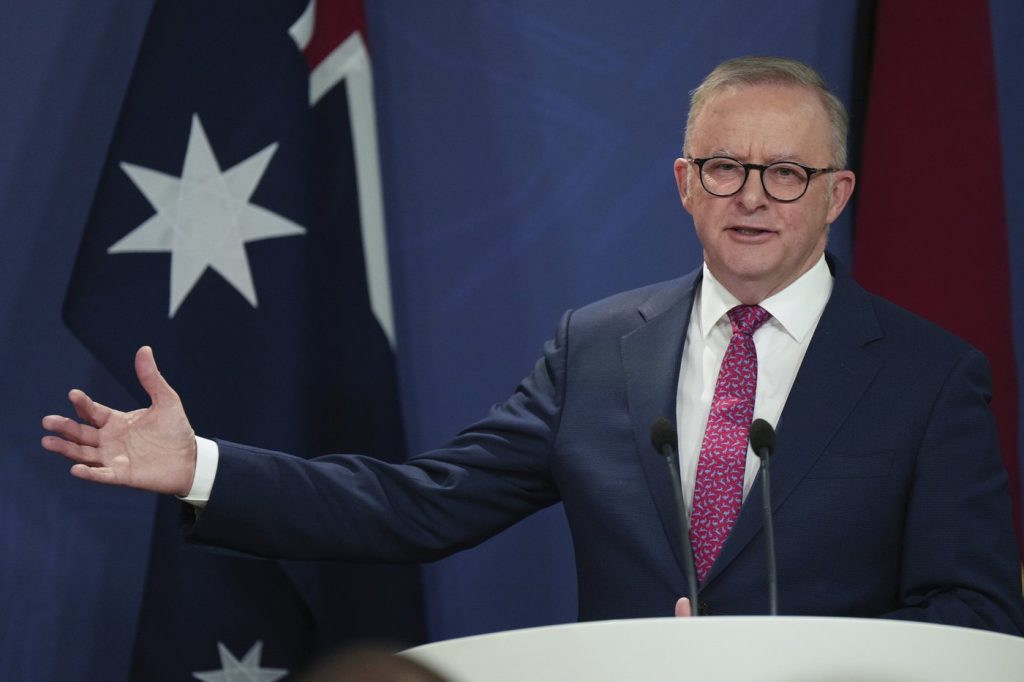MELBOURNE, Australia (AP) — Australia and Papua New Guinea's defense forces are set to be integrated under a new security pact to be signed this week, according to Australian Prime Minister Anthony Albanese. This initiative is aimed at curbing China's influence in the region, reflecting increasing geopolitical tensions. Albanese, alongside Papua New Guinea's Prime Minister James Marape, will officially sign the agreement on Wednesday, just one day after the celebration of Papua New Guinea’s 50th anniversary of independence from Australia.
The signing ceremony will also be attended by U.S. Deputy Secretary of State Christopher Landau in the capital, Port Moresby. Albanese emphasized that this pact signifies a substantial enhancement in the defense relationship between Australia and Papua New Guinea. He noted that it establishes mutual defense obligations, which would facilitate support and integration in terms of military assets and capabilities between both nations' defense forces.
With an estimated population of nearly 12 million, Papua New Guinea stands as the most populous country in the South Pacific after Australia, which has a population of approximately 27 million. The new pact will enable citizens from both nations to serve in each other's military forces, with Australia offering citizenship as an incentive for Papua New Guineans to enlist in its armed forces.
Currently, Australia’s military recruitment is limited to individuals from its Five Eyes allies, including the United States, United Kingdom, Canada, and New Zealand. This new agreement marks a shift in recruitment policy to include Papua New Guinea’s citizens, underscoring the relationship's depth.
The geopolitical landscape in the Pacific has been shifting, notably with three Pacific island nations changing diplomatic allegiance from Taiwan to China since 2019. This shift reflects China’s increasing influence in the region, particularly concerning security cooperation through police training programs in several countries including Fiji, Kiribati, Samoa, Solomon Islands, and Vanuatu. U.S. and its allies have expressed heightened concerns about China's growing presence in the Pacific region.
A previous security agreement between Australia and Papua New Guinea was established in 2023, reinforcing defense cooperation and positioning Australia as the preferred security partner in the area. However, the signing of this new pact faced a six-month delay due to a separate security deal made between the United States and Papua New Guinea under Marape's government, which led to public protests over concerns regarding national sovereignty.
Oliver Nobetau, who is involved with the Australia-Papua New Guinea Network at the Lowy Institute, commented on the significance of the language in the new pact regarding exclusivity. He highlighted that clarity on whether Australia would be recognized as the primary security partner for Papua New Guinea could represent a substantial achievement for Australia, considering many Pacific nations prefer to maintain a neutral stance in the contest for influence between U.S. allies and China.
Albanese had intentions to finalize a security and economic treaty with Vanuatu the previous week; however, concerns from Vanuatu's government over potential impacts on infrastructure funding from China have led to postponed negotiations. Australian Defense Minister Richard Marles indicated that the forthcoming bilateral treaty would supersede an older agreement made in 1977 with the newly independent Papua New Guinea, branding this as a transformative agreement between the two nations.
Marles further noted that discussions with Fiji and Tonga regarding advancing bilateral defense cooperation would continue, indicating Australia's commitment to enhancing its defense ties within the Pacific region.











